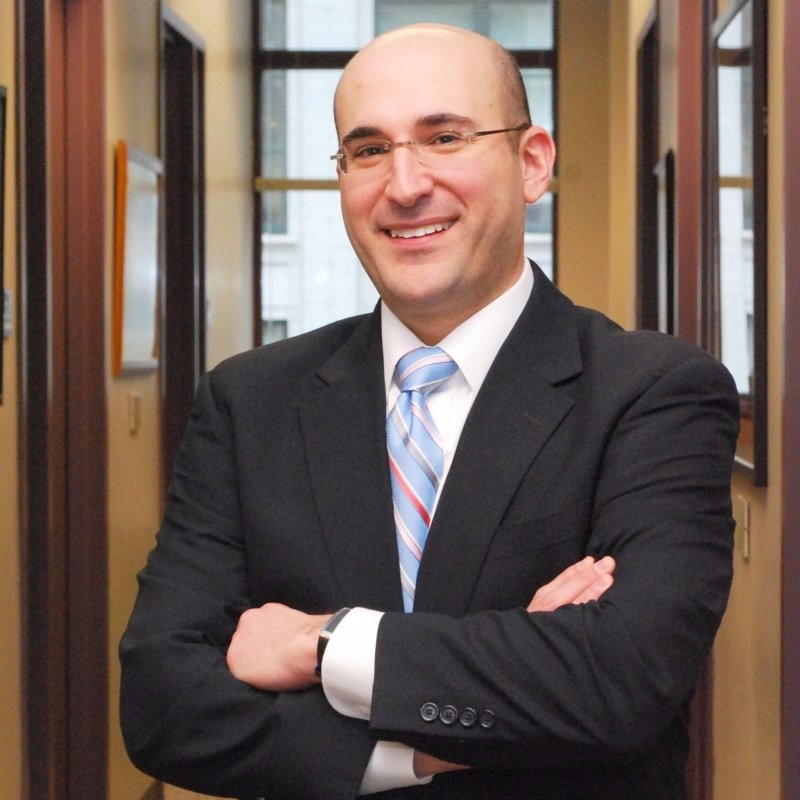
Robert S. Rubin didn't know he would spend more than a decade at DePaul University's Driehaus College of Business when he first came to Chicago from St. Louis. He arrived at DePaul in 2002 expecting to stay for a year in a visiting professorship. Then, a tenure-track position opened up, "and I've been happily stuck ever since."
"DePaul has been a terrific fit for me," says Rubin, an associate professor of management. "The focus on practice alongside of rigor, and balancing the two, is right in line with the way I view academics in business school. We should not only be thinking about how we further theory but also how we further practice. Those things are tied together."
Rubin's penchant for using research to make a difference in practical situations grew out of his background as an industrial-organizational psychologist. In that course of study, "you're really prepared to either go into industry and to use that research base to help organizations be more effective or to go into academics and to do the same thing but through the academic lens," he explains.
Training Analytical Thinkers
A continued emphasis on research and data leads Rubin to encourage business students to become scientist-practitioners, people who are trained to ask critical questions and solve problems by taking a rigorous approach. "My view is that we ought to be studying problems in organizations that are real and offering real solutions that practicing managers can implement," he says. For example, through a partnership with DePaul's Steans Center for Community-based Service Learning, graduate students in his MGT 798: Organizational Consulting Skills class work with nonprofits in the Chicagoland area.
DePaul also is helping practicing managers improve their skills through the new Doctorate in Business Administration (DBA). Rubin is part of the DBA curriculum committee and will be teaching "Leading Organizations Through People" when the first cohort begins in September.
"For me, it's a really exciting development," he explains. "The [DBA] allows our faculty to engage students in high-level learning about applied research and its practicality in order to help those students really further their organizations’ goals and their own careers."
Emphasizing Research
Rubin weaves discussions of research through all of his classes to help students think about how to become better leaders. "I think most often students don’t realize just how much good social science evidence we have to further the practice of management," he says. "People are exposed to a lot conventional wisdom through best-selling books, and it is often at odds with research evidence. There's usually a big gap there, and I spend a lot of time trying to close that research-practice gap."
In addition to scientific literature, the rise of data is also making people change their behavior. "The onset of big data and analytics is pushing people to see that their own subjective views of the world aren't necessarily where to start when it comes to decision making," Rubin says.
Outside of his busy classroom schedule, Rubin spends time researching, serving the industry, including his post as associate editor of the journal for the Academy of Management Learning & Education, and consulting — "which I love and I think makes me a better teacher and a better researcher." He enjoys researching topics that include leadership and graduate management education.
Shepherding the Business Education Insider
One way he examines business school trends is as the co-director of the Business Education Insider, a website based at DePaul that serves online resource for research, insights and news about management education issues, especially those affecting graduate business programs for working professionals. Rubin says he appreciates BEI's mission to share best practices with other business schools.
"The fact that we have the resources to further effectiveness in our own institution and then help others do that well makes a statement about how we view education — if we uncover educational practices that work, it's incumbent upon us to share those practices with other people," he says. "That's not common in a competitive environment, but that really is in line with DePaul's Vincentian values."
Amid all of his academic work, Rubin still balances spending time with his wife and family. They enjoy outdoor activities such as hiking, canoeing and camping, as well as playing music. As a trained musician — trumpet, drums, bass, keyboard and guitar — Rubin now spends time making music with his three children, ages 4 to 9. "With young kids, we just try to focus on them. You fit everything into the family."
Read more about DePaul's Doctorate in Business Administration.
Learn more about research by Robert Rubin and Erich Dierdroff in the Harvard Business Review and Chicago Tribune.